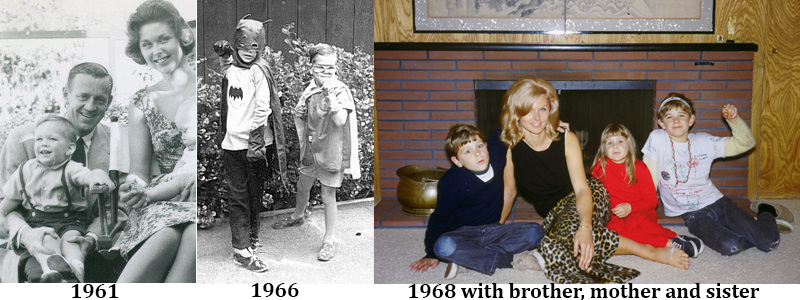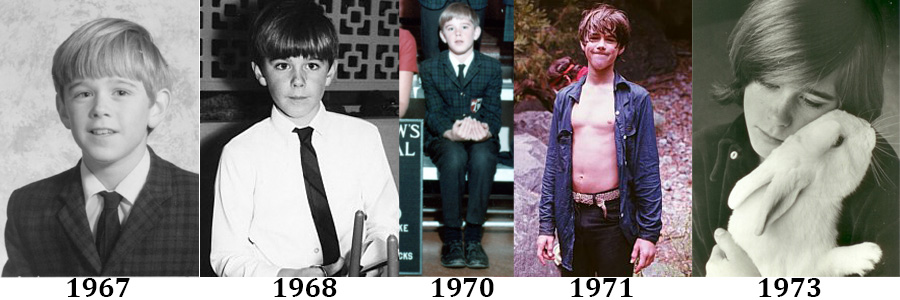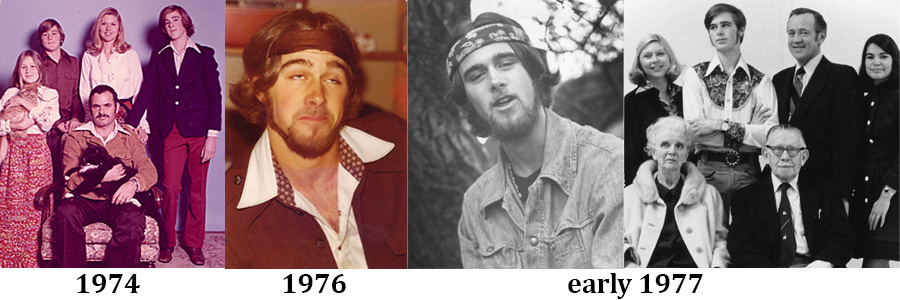Born in 1958, I have witnessed incredible social and technological changes: civil rights, the space race, political turmoil like Vietnam,
a major rennaisance in music and movies, and the Computer Age, to name a few. Yet, despite all of this massive change taking place in the world,
none of it impacted me more than the changes to come within me.
In an early draft of my memoir, I called myself a "typical, middle-class boy." More like typical-ish. My father's parents were rich, but held tightly onto their money. My father worked long hours to establish his own business, and without their help. My younger siblings and I attended parochial school in our hometown of San Mateo, a suburb of San Francisco, and grew up in a nice house. Eventually Dad's extended work hours put a strain on their marriage.

By the time I was nine my parents began fighting. Between Mom's growing independence and his long absences, their divorce was inevitable. This fracture wrought new anxities to heap upon my growing insecurities. Transsexuals often know from childhood that they're trapped in the wrong body, but I felt like I had been dumped onto the wrong planet. From nursery school on, I felt like I'd been left out—always clueless.
The divorce ended private, parochial school for us kids. I landed into the hell of public junior high. Bullies sized me up as the new kid, crowding and daring me to fight. I had no experience with this alien behavior, no macho boyskills to cope with it, so I learned to run away. I had no friends. The hippies and their Peace & Love ideal seemed Cool, so I grew out my hair to try to be one. I was dying to be Cool.

I was seldom certain of myself; I never knew how to act as a guy, never dated or went to dances or anything. I'd have been lost were it not for the computer terminals in our high school library. I loved computer programming; I could do it alone and it was the only thing that made me feel like I wasn't a loser. I tried hanging with the party crowd where I discovered marijuana as a cure for shyness and insecurity. But I was still a sissy. After several public bullyings, I became a loner. Gratefully, I graduated in January of 1976, a semester early.
Three weeks after starting junior college I dropped out, totally bored. My father offered me a minimum wage shop labor job at his scaffolding company. Then I moved in with a male coworker, who came onto me soon after my 18th birthday. Despite my longtime heterosexual desires, I was so horny I gave into my roommate. I broke off the affair two weeks later. I couldn't accept my bisexuality, so consumed with guilt and internalized homophobia I start getting stoned on marijuana every day.
Pot stifled my guilt and insecurity, so I smoked all day long. There was little I couldn't do when stoned. Yet I didn't know who I was or what I wanted to do; I knew I had no future. It was about then an Air Force recruiting package showed up. With so much to prove, I enlisted, and in February 1977 I left for Basic Training in Texas.

In an early draft of my memoir, I called myself a "typical, middle-class boy." More like typical-ish. My father's parents were rich, but held tightly onto their money. My father worked long hours to establish his own business, and without their help. My younger siblings and I attended parochial school in our hometown of San Mateo, a suburb of San Francisco, and grew up in a nice house. Eventually Dad's extended work hours put a strain on their marriage.

By the time I was nine my parents began fighting. Between Mom's growing independence and his long absences, their divorce was inevitable. This fracture wrought new anxities to heap upon my growing insecurities. Transsexuals often know from childhood that they're trapped in the wrong body, but I felt like I had been dumped onto the wrong planet. From nursery school on, I felt like I'd been left out—always clueless.
The divorce ended private, parochial school for us kids. I landed into the hell of public junior high. Bullies sized me up as the new kid, crowding and daring me to fight. I had no experience with this alien behavior, no macho boyskills to cope with it, so I learned to run away. I had no friends. The hippies and their Peace & Love ideal seemed Cool, so I grew out my hair to try to be one. I was dying to be Cool.

I was seldom certain of myself; I never knew how to act as a guy, never dated or went to dances or anything. I'd have been lost were it not for the computer terminals in our high school library. I loved computer programming; I could do it alone and it was the only thing that made me feel like I wasn't a loser. I tried hanging with the party crowd where I discovered marijuana as a cure for shyness and insecurity. But I was still a sissy. After several public bullyings, I became a loner. Gratefully, I graduated in January of 1976, a semester early.
Three weeks after starting junior college I dropped out, totally bored. My father offered me a minimum wage shop labor job at his scaffolding company. Then I moved in with a male coworker, who came onto me soon after my 18th birthday. Despite my longtime heterosexual desires, I was so horny I gave into my roommate. I broke off the affair two weeks later. I couldn't accept my bisexuality, so consumed with guilt and internalized homophobia I start getting stoned on marijuana every day.
Pot stifled my guilt and insecurity, so I smoked all day long. There was little I couldn't do when stoned. Yet I didn't know who I was or what I wanted to do; I knew I had no future. It was about then an Air Force recruiting package showed up. With so much to prove, I enlisted, and in February 1977 I left for Basic Training in Texas.

opens a new browser tab,
each with complex content.
� Christine D.Beatty
all rights reserved.